AD pathophysiological changes in the brain may begin decades prior to diagnosis but many patients are diagnosed only after advanced symptom onset. After identifying early stages of cognitive impairment and ruling out other causes, biomarkers can be used to confirm a diagnosis of AD. Biomarkers can help identify patients with AD early. Positron emission tomography (PET) imaging of amyloid plaque and cerebrospinal fluid (CSF) biomarkers, measuring amyloid-beta (Aβ) and tau, are each a well-established and validated tools to confirm the presence of Aβ accumulation. Blood-based biomarkers (BBMs) are a newer alternative to PET imaging and CSF-based testing methods for AD.
Learning Zone
Review self-guided learning decks on topics, including CSF AD biomarkers, advances in BBMs, amyloid PET, tau PET, structural imaging in AD, and much more.
Practical Zone
Review self-guided learning decks with a more practical focus on assessing atrophy with MRI, the clinical utility of amyloid PET, tau PET, and fluorodeoxyglucose (FDG) PET, the clinical utility of CSF AD biomarkers and practical considerations when conducting a lumbar puncture, and the utility of BBMs.
Visual and Video Zone
Review visual flashcards for quick learning on biomarkers and short videos comprising of on-demand video lectures given by biomarker experts that explore the most recent advances in their development. Alternatively, hear expert insights on future use of biomarkers in the evolving AD patient journey.
Video Lectures
Are biomarkers changing the
diagnostic pathway in AD?
Viewing time: 5 minutes
Speaker: Dr Suzanne Schindler
In this video, Dr Suzanne Schindler introduces AD biomarkers in the context of an evolving diagnostic pathway in AD.
What are AD biomarkers?
Viewing time: 5 minutes
Speaker: Dr Suzanne Schindler
In this video, Dr Suzanne Schindler explores the pathological hallmarks of AD and how this translates to biomarkers for AD diagnosis.
What are CSF biomarkers of AD?
Viewing time: 4 minutes
Speaker: Dr Suzanne Schindler
In this video, Dr Suzanne Schindler describes what CSF biomarkers are, explains what is being measured, and explores the accuracy of assays available.
What are blood-based biomarkers of AD?
Viewing time: 14 minutes
Speaker: Dr Suzanne Schindler
In this video, Dr Suzanne Schindler describes what blood-based biomarkers are and explores their diagnostic performance.
Challenges of AD diagnosis: focus on biomarkers
Viewing time: 5 minutes 40 seconds
Speaker: Dr. Oskar Hansson
Join Professor Hansson as he explores current diagnostic methods in AD and their limitations. He specifically focuses on finding from his landmark 2020 study and describes potential future use of BBMs to enhance routine clinical practice and to improve the diagnostic workup for AD.
Introducing amyloid PET
Viewing time: 6 minutes 40 seconds
Speaker: Dr. Susan Landau
In this presentation Dr. Landau provides an overview of the use of amyloid PET imaging in AD for both clinical and research use, including an exploration of the disconnect between amyloid positivity and the presence of cognitive symptoms that is observed in some individuals.
When and how are amyloid PET scans utilized in AD?
Viewing time: 9 minutes
Speaker: Dr. Ana Franceschi
In this video, Dr. Franceschi explores the role of amyloid PET and how it is used as an AD diagnostic biomarker in clinical practice.
What are common quantitative tools for amyloid PET image analysis?
Viewing time: 5 minutes
Speaker: Dr. Ana Franceschi
In this video, Dr. Franceschi discusses common quantitative tools for amyloid PET image analysis, including the standardized uptake value ratio, Z-scores and the Centiloid scale.
Introducing tau PET
Viewing time: 7 minutes 50 seconds
Speaker: Dr. Susan Landau
Join Dr. Landau as she explores the use of tau PET imaging in AD, including patterns of normal and AD-specific accumulation of tau in the brain, its link to cognitive symptoms, and use as a predictive biomarker. Dr. Landau also considers why tau elevation is heterogeneous, even among amyloid positive, symptomatic individuals with AD.
What is the added clinical value of a tau PET scan in AD?
Viewing time: 4 minutes
Speaker: Dr. Ana Franceschi
In this video, Dr. Franceschi explores the role of tau PET and its potential clinical value, including its ability to help stage the severity of disease in patients with AD.
Expert insights
Expert panel discussion:
The role of core biomarkers for AD diagnosis
Viewing time: 17 minutes
In this video, Dr Frank Jessen, Dr Alessandro Padovani, and Dr Kaj Blennow consider the role of core CSF and neuroimaging biomarkers in AD, including the advantages and challenges of these modalities and their use in clinical practice.
Expert panel discussion:
The role of blood-based biomarkers in AD diagnosis
Viewing time: 15 minutes
Dr Frank Jessen, Dr Alessandro Padovani, and Dr Kaj Blennow consider blood-based biomarkers in AD, their potential utility in primary care, and the support and changes that will be needed within healthcare systems to enable their widespread use in the future.
Advances in biomarkers that can provide an accurate and early diagnosis of AD
Viewing time: 10 minutes
Speaker: Dr Suzanne Schindler
Dr Schindler provides her insights and perspectives on the following questions:
• What biomarkers are available to diagnose AD?
• How are biomarkers implemented in clinical practice currently?
• What are blood-based AD biomarkers and what do they measure?
• How are these blood-based biomarkers potentially going to be used in clinical practice?
Infographics
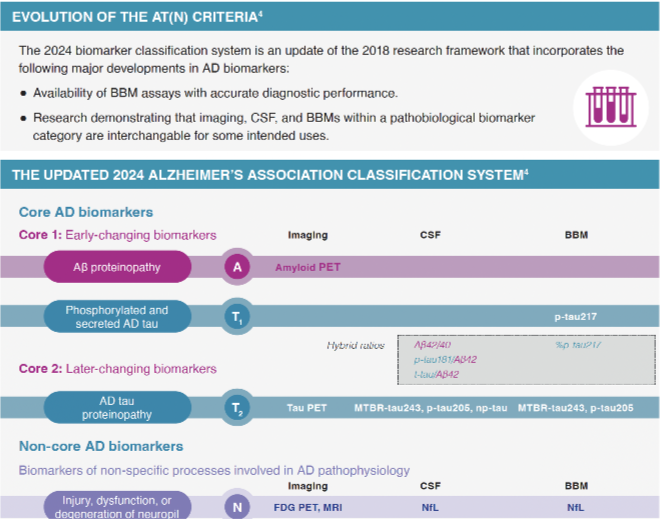
Evolution of the biomarker classification system for describing biological changes in AD
Infographic
View this infographic to learn about the biomarker classification system as a research framework for the diagnosis and evaluation of AD based on temporal changes in AD biomarkers.
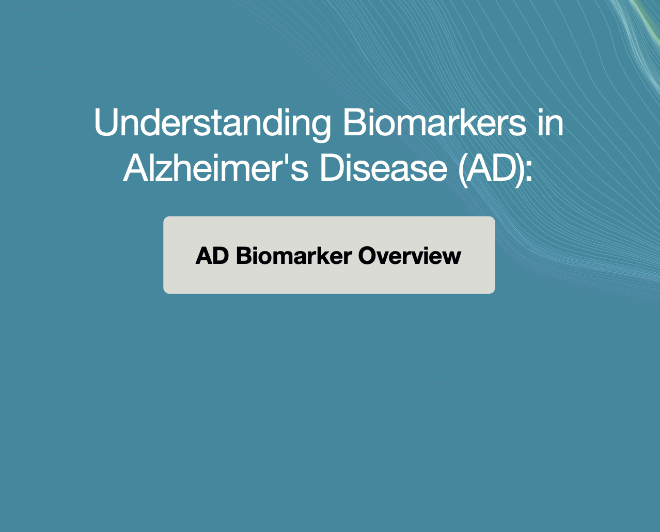
AD biomarker overview
Infographic
View this infographic to learn about available biomarker modalities that can support an early diagnosis of AD.
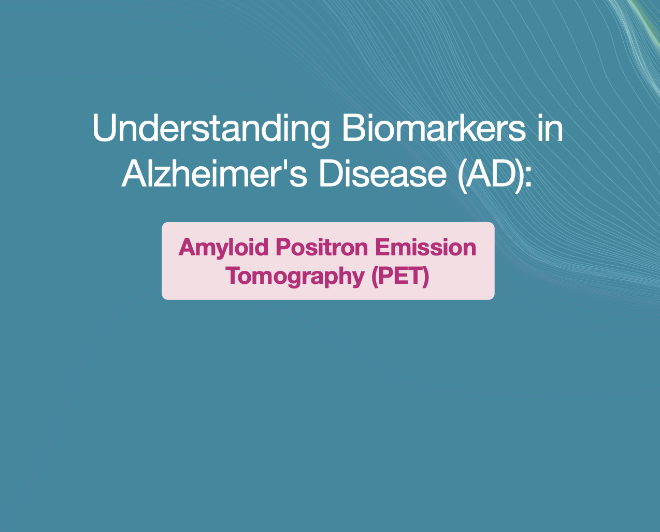
Amyloid positron emission tomography (PET)
Infographic
View this infographic to learn about amyloid PET as a diagnostic neuroimaging tool that can confirm the presence, level, and distribution of amyloid in the brain.
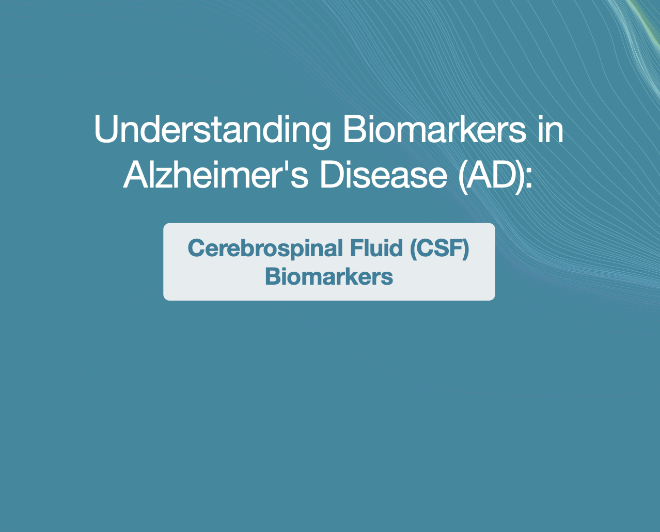
Cerebrospinal fluid (CSF) biomarkers
Infographic
View this infographic to learn how AD-related pathology can be detected in CSF and may support an early diagnosis.
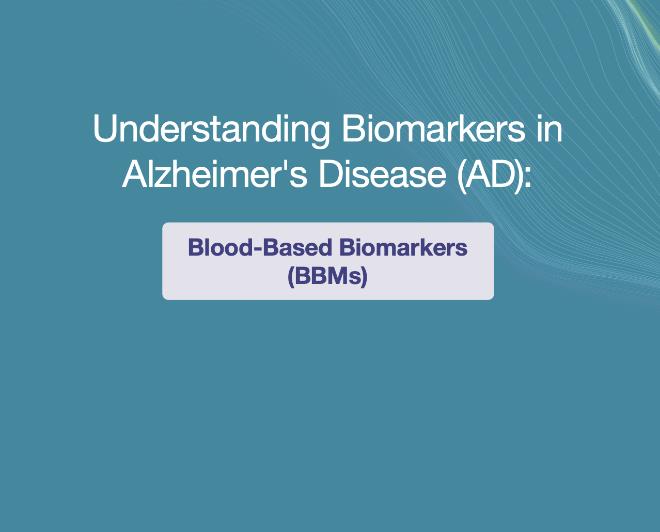
Blood-based biomarkers (BBMs)
Infographic
View this infographic to learn more about the strengths and limitations of using blood-based biomarkers to evaluate AD pathological changes.
References
- Alzheimer’s Association. 2023 Alzheimer’s disease facts and figures. Alzheimers Dement. 2023;19(4):1598-1695.
- How biomarkers help diagnose dementia. National Institute of Aging. Updated January 21, 2022. Accessed September, 2024. https://www.nia.nih.gov/health/biomarkers- dementia-detection-and-research
- Nakamura A, et al. Nature. 2018;554(7691);249-254.
- Schindler SE, et al. Neurology. 2019;93(17):e1647-e1659.
- Palmqvist S, et al. JAMA Neurol. 2019;76(9); 1060-1069.



